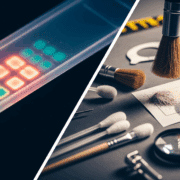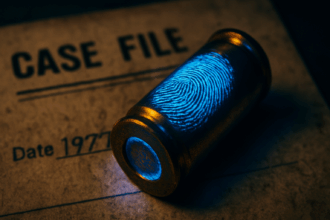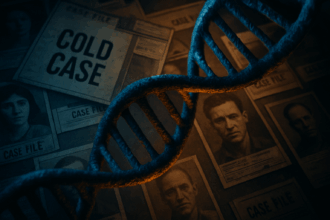Introduction
- The Wrongful Conviction of Robert DuBoise
- The Breakthrough Discovery of DNA Evidence
- Flaws in Forensic Evidence: The Discredited Bite Mark Analysis
- The Unreliable Jailhouse Informant Testimony
- Exoneration and Release
- The Role of the Innocence Project
- Impact on the Criminal Justice System
- The Personal Cost to Robert DuBoise
- Conclusion: The Importance of Justice and Scientific Integrity
In a monumental case, Robert DuBoise has been exonerated after spending 37 years in prison for a crime he did not commit. His conviction, based on flawed forensic evidence
 DNA, or Deoxyribonucleic Acid, is the genetic material found in cells, composed of a double helix structure. It serves as the genetic blueprint for all living organisms. Read Full Definition evidence that conclusively proved his innocence. This case serves as a powerful reminder of the critical role forensic science
DNA, or Deoxyribonucleic Acid, is the genetic material found in cells, composed of a double helix structure. It serves as the genetic blueprint for all living organisms. Read Full Definition evidence that conclusively proved his innocence. This case serves as a powerful reminder of the critical role forensic science
The Wrongful Conviction of Robert DuBoise
In 1983, 19-year-old Barbara Grams was raped and murdered in Tampa, Florida. Robert DuBoise, just 18 at the time, was wrongfully convicted of her brutal death two years later. The prosecution relied heavily on questionable bite mark analysis and the testimony of a jailhouse informant to secure his conviction. Despite maintaining his innocence throughout the trial, DuBoise was sentenced to death, though the sentence was later commuted to life in prison.
The Breakthrough Discovery of DNA Evidence
The turning point came in August 2020 when the Innocence Project, a nonprofit organization focused on exonerating wrongfully convicted individuals, requested a thorough review of DuBoise’s case. The Hillsborough County Conviction Review Unit uncovered preserved rape kit samples from the original 1983 case, which had not been used during the trial. The DNA analysis of these samples excluded DuBoise and identified DNA from two other men, one of whom has since become a person of interest in the investigation.
Flaws in Forensic Evidence: The Discredited Bite Mark Analysis
One of the central issues in DuBoise’s conviction was the use of bite mark evidence, which has since been widely discredited by the scientific community. In fact, the National Academy of Sciences and numerous forensic experts have criticized the validity of bite mark analysis, highlighting its unreliability in criminal cases. In DuBoise’s case, the bite mark analysis was pivotal in securing his wrongful conviction. The expert who testified at DuBoise’s trial has since renounced his findings, further undermining the prosecution’s case.
The Unreliable Jailhouse Informant Testimony
Another major flaw in the case was the reliance on the testimony of a jailhouse informant. Jailhouse informants have often been criticized for providing unreliable testimony in exchange for reduced sentences or other benefits. In DuBoise’s case, the informant’s testimony was found to be inconsistent and lacking credibility, further casting doubt on the legitimacy of the conviction.
Exoneration and Release
On August 26, 2020, prosecutors and DuBoise’s legal team filed a joint motion to reduce his life sentence to time served, leading to his eventual release. Andrew H. Warren, Hillsborough County State Attorney, issued a public apology to DuBoise, acknowledging the grave miscarriage of justice and the devastating impact it had on his life. Warren emphasized that cases like DuBoise’s erode public trust in the criminal justice system and allow real perpetrators to escape accountability.
The Role of the Innocence Project
The Innocence Project played a pivotal role in Robert DuBoise’s exoneration, using advances in DNA testing to reveal the truth. The nonprofit’s efforts ensured that previously overlooked evidence was reexamined, ultimately leading to DuBoise’s release. Notably, DuBoise had requested DNA testing in 2007, but his motion was denied due to the belief that the trial evidence had been destroyed. However, the Innocence Project’s persistence led to the discovery of the preserved rape kit samples, which proved his innocence.
Impact on the Criminal Justice System
This case highlights the need for significant reforms in the criminal justice system, particularly in how forensic evidence and witness testimony are handled. Wrongful convictions not only destroy innocent lives but also diminish public trust in the system. The exoneration of Robert DuBoise underscores the importance of ongoing advancements in forensic science and the need for rigorous standards to prevent future miscarriages of justice.
The Personal Cost to Robert DuBoise
Robert DuBoise’s wrongful conviction took 37 years from his life—years he spent incarcerated for a crime he did not commit. While in prison, he missed out on personal milestones, including the passing of his father. Upon his release, DuBoise expressed a desire to reconnect with his family and experience the simple pleasures of life that had been denied to him, such as going to church and visiting the beach.
Conclusion: The Importance of Justice and Scientific Integrity
The exoneration of Robert DuBoise is a powerful reminder of the fallibility of the criminal justice system and the critical role that forensic science plays in ensuring fairness. DNA evidence has once again proven to be a game-changer in overturning wrongful convictions, highlighting the need for continual improvements in the use and interpretation of forensic evidence. As the legal community reflects on this case, it is clear that vigilance, scientific integrity, and a commitment to truth are essential in the ongoing pursuit of justice.
Source: DNA Evidence Exonerates Man in 1983 Rape and Killing, Prosecutors Say – The New York Times









